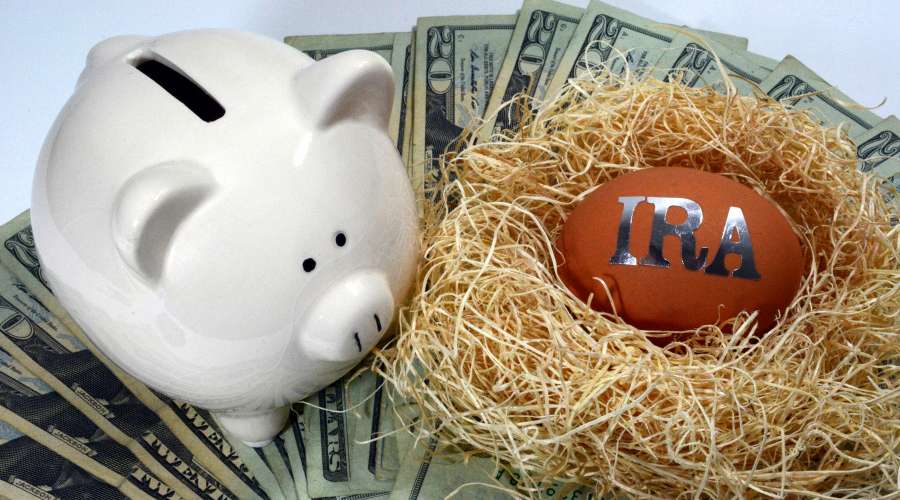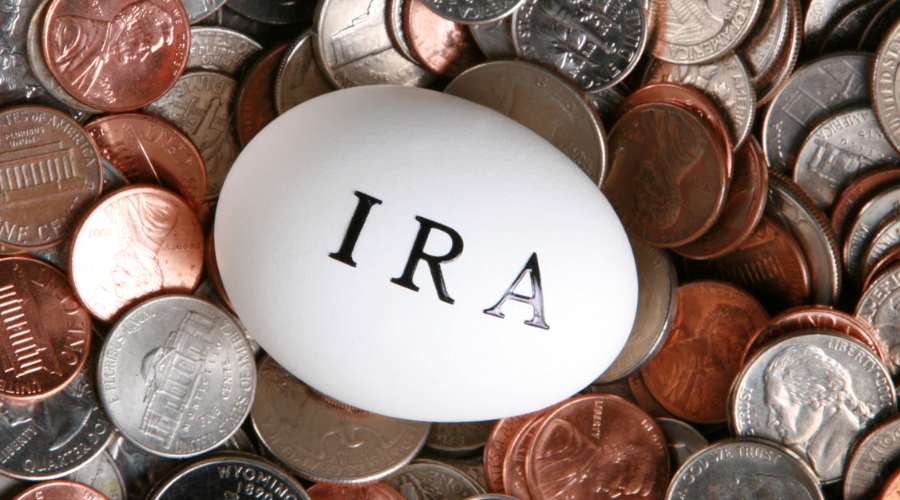It's a common misconception that IRAs are just for retirement. But there are two different types of IRA accounts—traditional and Roth. A traditional IRA is a tax-deferred account that earns interest on your contributions and offers tax deferral on any earnings or capital gains. With a Roth account, you pay taxes on the contributed money but get it back plus growth minus any penalties when you withdraw.
If you are interested in investing, make sure to take a look at our highest recommended companies for this year!
>> Click Here For A List Of The 5 Highest Recommended Precious Metals Investment Companies <<
How Do Gold IRAs Differ from Traditional Ones?

Gold IRAs are considered FDIC-insured investment vehicles, which means they carry none of the risks inherent to other investments, such as stocks and bonds in shares of mutual funds. Gold IRAs are also completely protected from market fluctuations and unusual losses. If you don't withdraw for five years, your gold within the IRA is free to keep.
Both types of IRAs offer tax deferral and growth on your savings; however, the differences in their tax treatments can pay off over time. Traditional IRAs pay taxes on any gains or earnings from the account, while Roth accounts are taxed initially.
Traditional IRAs are designed for retirement, after all, and that works well when you're young, single and have no children. A Roth IRA is a good option when you have other assets to draw income from, such as a business or rental property.
Another time when the difference between traditional and Roth IRAs becomes clearer is if your only source of income is your earnings. In that case, it becomes critical to consider each plan's tax benefits and pitfalls. If you don't have any assets outside of the account or want to do it right away, there's no reason not to open a gold IRA instead of just opening up another traditional one.
If you don't take any withdrawals from a traditional IRA for at least five years, it will be completely tax-free. However, with a gold IRA account, the holder can take out the initial contributions without penalties or taxes. And since gold is considered a "collectable" by the IRS, it's taxed at 28% after five years - less than savings accounts and CDs at a bank (taxed as ordinary income).
But when you get to 25 years in retirement, capital gains taxes kick in; so if you're planning on not touching your money for that long anyway, go ahead and make your contribution through a gold IRA. Just make sure that your contribution is $5,000 or less. If you withdraw before then, you will have to pay ALL the taxes.
When it comes time to withdraw money from the account if you're under 59 and a half – depending on when you open your account, there could be penalties, the IRS penalizes early withdrawals on traditional IRAs with a 10% penalty in addition to tax on all earnings in the account for someone under age 59 and a half who does not become disabled or pass away during that period. There are no penalties for those over age 59 ½ for taking money out of their accounts early, but if they do take them out before this age, they are taxed at ordinary income tax rates.
With gold IRAs, the rules are a little different. You're not penalized for taking out your money early, but you will have to pay a 10% penalty in addition to any tax you owe. The IRS charges penalties and taxes when you take money out of traditional IRAs up to the amount paid. With gold IRAs, your earnings and withdrawals will be taxed or penalized once they reach $1,500. So if three years after opening an account with $50,000 in it, you take out $1000 – taxed at your current income level – there will be no penalty and no income tax on that withdrawal.
One way to get around this is to open a Roth IRA instead. While contributions are taxed, the earnings grow tax-free. There is a five-year waiting period before you can open a Roth account and start taking out your money, but if you can afford to contribute upfront, you could benefit from it later on when you're retired.
The bottom line is that gold IRAs are another investment option for your retirement bankroll. They come with all the benefits of other retirement plans like tax-deferral and capital growth, but with the added benefit of withdrawing money without paying penalties or taxes if it's an emergency.
How Does a Gold IRA Work?

A gold IRA works similarly to a traditional IRA. Still, the account holder can hold physical gold or other precious metals instead of paper assets like stocks, bonds, or mutual funds.
To set up a gold IRA, you must select a custodian to hold the physical gold on your behalf. The custodian will also administer the account and report any gains or losses to the IRS. Some common custodians for gold IRAs include banks, trust companies, and precious metal dealers.
To fund the account, you can either roll over funds from an existing IRA or 401(k) into the gold IRA or make a new contribution. The IRS limits the amount of money that can be contributed to a gold IRA each year based on the individual's age and income level.
Once the account is funded, you can begin purchasing gold and other precious metals for the account. The types of gold that can be held in a gold IRA include bullion (such as gold coins and bars) and numismatic coins (rare or collectable coins that have a value beyond their gold content). The gold must meet certain purity standards and be stored in an IRS-approved depository.
The market price of gold determines the value of the gold in the IRA at the time of purchase or sale. Any gains or losses on the gold are taxed as capital gains or losses, depending on whether the gold was held for more than one year.
The IRS encourages individuals to use the services of a commodity broker as a custodian for their gold IRA. A broker will deal with all the complexities in purchasing and selling precious metals, so you should feel safe that your gold is being held safe.
The following are some things to keep in mind when opening a gold IRA:
Gold is typically more expensive than the metals used in precious-metal investment plans, and these IRA accounts are no exception. There are a variety of gold coins in varying quantities available for purchase. Each coin is weighed by hand before it's sold to establish its market value when you make your purchase, so prices may vary depending on whether you buy one ounce or 10 ounces of gold.
There are also a variety of metals that make up bullion, including silver, platinum, and palladium. The IRS also limits the number of precious metals that can be held in an IRA or 401(k) plan to protect against market fluctuation.
You can open a gold IRA if you meet the following criteria:
Transferring Funds From a Traditional IRA or 401(k) Into a Gold IRA

The process for transferring funds from a traditional IRA or 401(k) into a gold IRA is the same as it would be for any other investment. You'll need to open an account with your chosen custodian and provide the necessary paperwork, including tax forms and other legal documents. Your custodian will send the paperwork to your previous institution to ensure your investment is transferred properly.
If you decide that you'd like to begin investing in gold, there are several factors that you should consider:
The popularity of precious metals has grown considerably in recent years, so now may be a good time to invest in them before prices rise even higher.
However, you need to look closely at the terms of your IRA or 401(k) before you invest; some plans don't allow investment in gold or other precious metals, which could mean losing some of your funds when you transfer them out.
Gold has done well historically compared to other investments like stocks and bonds. However, it may do better in the future. Gold prices fluctuate quite over time; for example, in 1971, it was just $35 per ounce. In January 1980, it reached over $800 per ounce before dropping back to the low $300s by December of that year. It was around $300 per ounce for most of the 1980s, but climbed back over $400 in 2001 and then dropped to around $250 in 2003. It rose again to over $600 by 2005 and increased steadily until 2011, hitting a high of just over $1900 in 2012 before beginning to decline. While the price has fallen since 2012, it is still one of the more successful investments you can make.
What Are the Benefits of a Gold IRA?
Gold's advantage is that it can protect you from market fluctuations. Stocks and bonds can both be affected by inflation, but your gold will still retain its value as long as it's kept safe.
If a stock market crash occurs, your gold will typically hold its value better than other investments, although it can still decline if gold prices drop significantly.
This can be a particularly good type of IRA to invest in through retirement accounts because you can transfer funds from one of your existing accounts into it without incurring any penalties or additional taxes.
Gold is often used as an inflation hedge, so if stocks and bonds decline because of rising inflation (which is also expected to cause the dollar to depreciate), you can protect yourself by investing in gold. It's also a good choice for individuals looking to diversify their holdings with precious metals.
Even having a portion of your investments in gold can be used as a hedge against inflation. This is particularly true if you're planning to retire soon and want to protect yourself against a drop in the value of your portfolio. For example, if inflation rises by 5% over the next year, the dollar's value will decrease by 5%. If you hold gold in an IRA and have 10% invested, you can expect it to rise by about 11% over that period.
The IRS regulations regarding IRA investments will protect you from market fluctuation if your account balance is maintained at even increments of $5,000 or more.
Investing in a gold IRA will also help protect your portfolio against the dollar's devaluation. While gold is typically subject to price fluctuations, it has historically been less volatile than other investments.
When you invest in gold, you're also investing in something that is directly related to our economy. Gold can be affected by market swings and inflation, but it still offers a good return on investment when compared with most other types of investments.
Since many of the world's investment banks and corporations will be affected by potential changes in the dollar, your gold investment may be a good way to protect yourself during volatile times. Gold can also serve as an alternative currency for countries like China and India that are weakening their own currencies for economic reasons.
Since gold is related to our economy, it can also serve as an emergency reserve if our national economy or stock market experiences an economic downturn. If stocks and bonds begin to fall, you're likely able to protect yourself with your gold IRA.
A strong dollar could also affect the price of gold, which would mean you could expect a drop in your gold IRA if you have one when things stabilize. By investing in a gold IRA now, you can protect yourself when things return to normal.
You can invest in gold if you're already retired or are planning on retiring soon. Since taxes will severely restrict your total holdings once you begin taking distributions from your IRA or 401(k), it's a good idea to protect your portfolio from inflation as much as possible.
How to Buy and Sell Gold Within a Gold IRA

Buying gold in a gold IRA requires two steps: purchasing gold and then holding it within the IRA.
Buying Physical Gold
You can buy physical gold for your precious metals IRA in three ways:
Buying from your broker will allow you to choose from several investment products, including bars and coins, which may be easier to work with than bullion or proof bars. However, this option is only available to those with an established relationship with their broker or financial advisor.
If you're planning on investing in a gold IRA and want to use your broker to purchase the gold, the company typically will charge a commission of between $49.95 and $450 per transaction, depending on which type of option you choose. You'll be charged a minimum fee of between $5 and $35 per transaction and a maximum fee of up to 5% of the total amount invested.
If you have an advisor who has already been working with your brokerage firm for several years, you may be able to access this option under certain circumstances. You could also choose to invest in physical gold through dealers who deal in bullion or bullion bars.
Unfortunately, there are few reliable dealers in gold bullion, as it's a relatively smaller commodity. Gold is often considered one of the best investments because of its relatively stable value. Still, with so few dealers who deal in physical bullion and limited options for investors who want this type of product, many investors are turned off by the prospect of purchasing gold through bullion dealers.
Finding a local dealer can allow you to avoid having to deal with a broker and brokerage firm when you order your precious metals. You can even get a better deal by dealing with an independent seller directly instead.
Buying from an independent seller can also give you more control over the amount of gold you receive at each transaction. Since these dealers are already established in their community, they can sometimes negotiate better deals with suppliers.
Buying Gold Directly from Gold Suppliers

Check their reputations before investing in gold if you plan on purchasing gold from a supplier directly. While several reputable companies out there deal in gold, others are taking advantage of people looking for a quick investment or want to sell items at very low prices.
Gold suppliers often offer good prices for precious metals, but you should look for independent sellers rather than companies who act as middlemen between you and the seller.
Trading Gold in Your Gold IRA
If you buy gold from a dealer or supplier who does not deal in precious metals, your options for trading gold in your IRA may be limited.
The way it works is that your broker will hold physical gold for you until you have invested enough to meet the minimum amount required by the IRS. Once you reach the minimum amount, you can choose to have the gold delivered to you at once or over time. Either way, your broker will set up a separate account for storing the metal until it can be dispensed into a rollover IRA or other investment vehicle.
If you want to sell gold from your IRA, you can sell directly through a broker or your gold supplier.
While it's possible to trade gold in a gold IRA through your broker, some brokers will charge you a higher commission for trading in precious physical metals. Check the fee schedule with your broker to see if that is within your budget.
If you want to sell physical gold from your IRA and avoid having it delivered, speak with your broker about ways to sell it to a supplier to avoid paying high commissions on each transaction.
Gold IRAs offer various benefits, including the ability to protect your portfolio from inflation and the option to invest in a precious metal that has a long history of stability. If you have an IRA or 401(k) account, you can buy and sell gold within these retirement accounts.
Although there are many benefits to a gold IRA, make sure to speak with your tax advisor before purchasing before making any final decisions. While investing in a gold IRA gives tax advantages and saves you on commissions, it can also result in penalties if your holdings exceed certain amounts.
Don't forget to check out our top recommended companies before investing!
